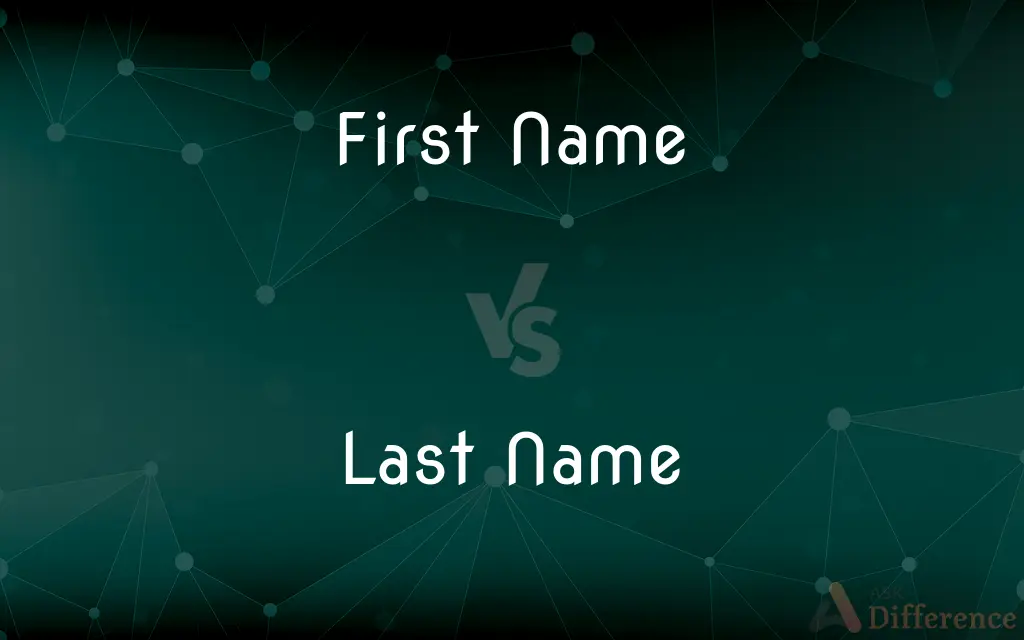First Name vs. Last Name — What's the Difference?
Edited by Tayyaba Rehman — By Fiza Rafique — Published on October 2, 2023
A first name, also called a given name, is a personal name given at birth or during a naming ceremony, while a last name, also known as a surname or family name, represents family lineage or ancestry.

Difference Between First Name and Last Name
Table of Contents
ADVERTISEMENT
Key Differences
A first name and a last name are fundamental identifiers in personal naming conventions. The first name, often termed a given name, is typically chosen by parents and is a unique identifier for an individual. Conversely, the last name, or the surname, identifies the family or clan to which one belongs and often remains consistent across generations.
In most Western cultures, the first name is presented before the last name. For instance, in the name "Emily Dickinson," "Emily" stands as the first name and "Dickinson" signifies the last name. This order, however, may differ in some cultures where the family name precedes the given name.
Both first name and last name hold cultural, familial, and historical significance. While first names might be chosen based on personal preferences, religious reasons, or familial traditions, last names generally trace lineage and ancestry, representing familial ties that span generations.
In formal settings, both first name and last name are usually required. However, in casual or familiar settings, individuals are often addressed by their first names. The last name becomes paramount in official documents, lineage tracing, or when distinguishing between individuals with common first names.
The usage of first name and last name also reflects social norms and customs. In many cultures, it's considered respectful to address someone by their last name and a title, while using the first name might indicate intimacy or familiarity.
ADVERTISEMENT
Comparison Chart
Basic Definition
Personal name given at birth or naming ceremony
Name representing family lineage or ancestry
Also Known As
Given name
Surname, Family name
Significance
Individual identity
Familial or clan identity
Usage in Casual Settings
Commonly used for direct address
Less frequently used
Order in Western Cultures
Usually comes before the last name
Typically follows the first name
Compare with Definitions
First Name
A name chosen based on personal, cultural, or religious preferences.
His first name, Arjun, has significant meaning in Hindu mythology.
Last Name
A name passed down through generations.
She inherited her last name from her ancestors.
First Name
The name given to an individual at birth.
Her first name is Jessica.
Last Name
Sometimes called a surname or family name.
Her last name is representative of her Irish heritage.
First Name
The name preceding the surname in most Western cultures.
In James Bond, James is the first name.
Last Name
The name indicating family lineage or ancestry.
Their entire family shares the last name Smith.
First Name
Commonly used for direct or familiar address.
Please call me by my first name.
Last Name
Important for official documents and formal introductions.
Please provide your first and last name for registration.
First Name
A primary identifier unique to the individual.
Many people share the first name Michael.
Last Name
Typically follows the first name in Western naming conventions.
In Jane Austen, Austen is the last name.
Common Curiosities
Can two people have the same last name without being related?
Yes, many people can share a last name without a direct familial connection.
How is a last name different from a first name?
A last name, or surname, represents family lineage or ancestry, whereas a first name is a unique personal identifier.
What is a first name?
A first name is a personal name given to someone at birth or during a naming ceremony.
Is the first name always mentioned before the last name?
In most Western cultures, yes, but the order can differ in other cultures.
Why might someone change their first name?
Reasons can include personal preference, religious conversion, or gender transition, among others.
Why do women sometimes change their last name after marriage?
It's a tradition in some cultures for women to adopt their husband's last name, though practices vary.
Is it considered informal to address someone by their first name?
In many cultures, using a first name indicates familiarity or informality.
What's the significance of a maiden name?
A maiden name is a last name used by someone, typically a woman, before adopting a new surname, often after marriage.
Why might someone hyphenate their last name?
Hyphenation can represent the combination of two family names, often due to marriage.
How do naming conventions differ globally?
Naming practices vary based on cultural, religious, and legal norms, affecting the order, number, and significance of names.
Can a person have multiple first names or last names?
Yes, it's common for people to have middle names or multiple surnames.
Is the last name synonymous with a family name?
Yes, last name, family name, and surname are often used interchangeably.
Is it compulsory to have both a first name and a last name?
Most cultures and legal systems require both for official documentation, but practices can vary.
What's a middle name?
A middle name is an additional name placed between the first name and last name.
Can last names provide insights into ancestry?
Often, yes. Many last names have origins indicating geographic, occupational, or familial roots.
Share Your Discovery

Previous Comparison
Brand Name vs. Trademark
Next Comparison
Mall vs. Department StoreAuthor Spotlight
Written by
Fiza RafiqueFiza Rafique is a skilled content writer at AskDifference.com, where she meticulously refines and enhances written pieces. Drawing from her vast editorial expertise, Fiza ensures clarity, accuracy, and precision in every article. Passionate about language, she continually seeks to elevate the quality of content for readers worldwide.
Edited by
Tayyaba RehmanTayyaba Rehman is a distinguished writer, currently serving as a primary contributor to askdifference.com. As a researcher in semantics and etymology, Tayyaba's passion for the complexity of languages and their distinctions has found a perfect home on the platform. Tayyaba delves into the intricacies of language, distinguishing between commonly confused words and phrases, thereby providing clarity for readers worldwide.















































